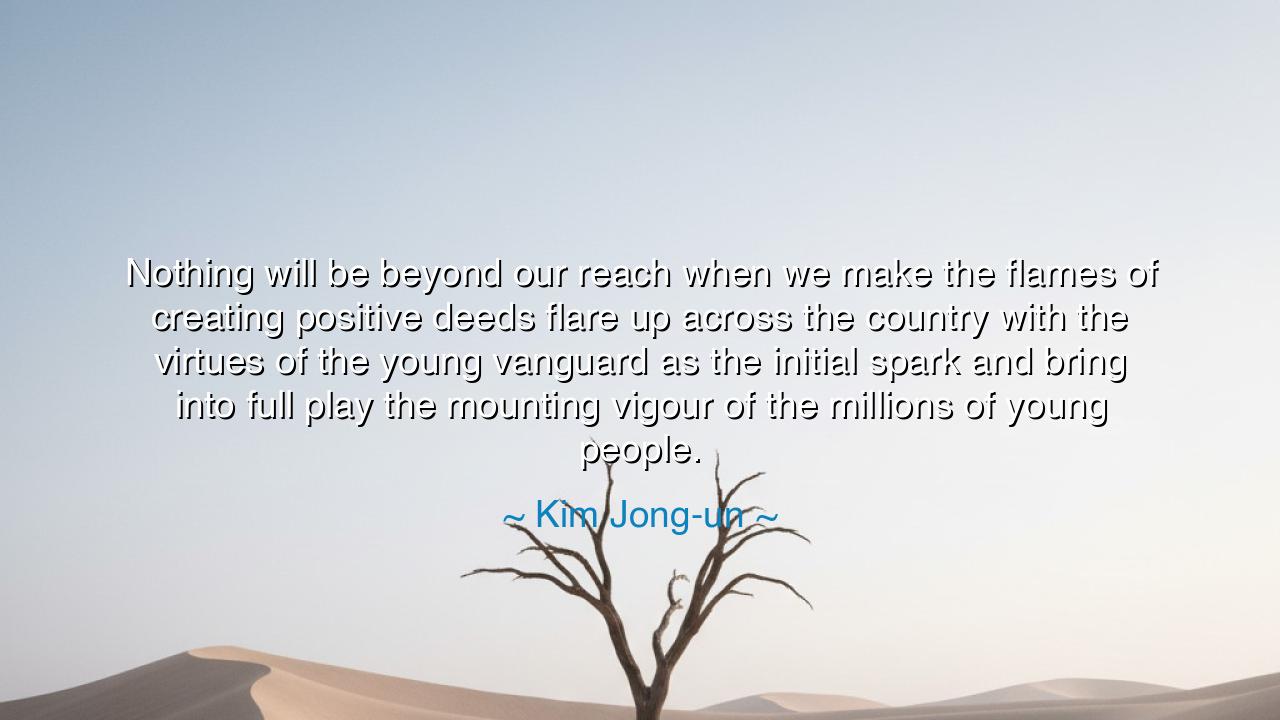
Nothing will be beyond our reach when we make the flames of
Nothing will be beyond our reach when we make the flames of creating positive deeds flare up across the country with the virtues of the young vanguard as the initial spark and bring into full play the mounting vigour of the millions of young people.






When Kim Jong-un declared, “Nothing will be beyond our reach when we make the flames of creating positive deeds flare up across the country with the virtues of the young vanguard as the initial spark and bring into full play the mounting vigour of the millions of young people,” he spoke in the language of fire and destiny. His words, though rooted in his nation’s vision, carry a timeless truth: that the energy of youth, once kindled with purpose, becomes a force that can shape the very course of history.
The ancients often spoke of the flame as symbol and spirit. Prometheus, defying the gods, stole fire and gifted it to humankind, thereby granting power, progress, and creation. In Kim’s words, this same imagery reappears—flames not of destruction, but of positive deeds, spreading like a holy fire across a land. The vanguard, the youth, serve as the spark—a small beginning that awakens the greater blaze of transformation. Thus, the quote envisions change not as decree from above, but as the swelling of collective vigour born of the rising generation.
History gives us clear examples of this principle. Consider the civil rights movement in America, where young students filled the streets, sat at lunch counters, and marched with steadfast hearts. Their courage, their virtues, ignited a flame that spread beyond their own numbers, awakening the conscience of a country. They were the vanguard, and from their spark rose a fire of justice that altered the course of a nation.
The words also speak to the power of unity. A single torch may flicker, but when joined by the torches of millions, the night is driven back. So too, when young people unite their strength and channel their vigour toward creation and not destruction, the impossible becomes possible. In this, Kim echoes a universal truth: that the dreams of the many, when joined, extend the reach of humanity far beyond what any single hand could achieve.
Therefore, let us carry this teaching forward: the virtues of youth are not to be dismissed, but to be cultivated as the spark of the future. Their energy, their courage, their will to act—these are the fires that build nations and heal broken worlds. And when their positive deeds multiply, nothing, indeed, will be beyond our reach. For the destiny of tomorrow is forged in the burning spirit of the young today.






PTThanh Hang Pham Thi
This quote paints a vision of a united country where youth are empowered to drive positive change, which sounds like an admirable goal. But it also makes me question the role of leadership in shaping this 'young vanguard.' If the 'flames of creating positive deeds' are directed by a single ideology, is there room for alternative viewpoints and creativity? Or does this rhetoric primarily serve the purpose of reinforcing political power?
VVDung Van Vu
The idea of using the passion and energy of youth to achieve a common goal is appealing, but the emphasis on the 'virtues of the young vanguard' makes me wonder who gets to decide what those virtues are. Could this be an attempt to create a unified ideological front rather than fostering genuine innovation? What happens to youth who don’t align with the prescribed virtues? Is this movement truly inclusive or merely a political tool?
GMGia Minh
I find this statement optimistic, as it places faith in the energy and ideals of young people. However, it’s important to ask whether this vision is inclusive. Are all young people truly being given the opportunity to bring their unique contributions forward, or is it a uniform call to conform to a certain ideal? Can such a large-scale movement for positive change work without restricting individual thought?
NNnhat nhat
While this quote does suggest a powerful image of youth leading the way for positive change, it raises the question of how realistic it is to expect an entire generation to act as one. How much of this call for action is genuine and how much is a strategic appeal to youth for political gain? Is it empowering to the younger generation, or does it place too much responsibility on them to fix societal issues?
MPMaiphuong Pham
The idea of empowering youth and encouraging collective effort is something that resonates universally. However, I find the notion of using the 'virtues of the young vanguard' to fuel change a bit concerning. What defines those virtues, and who gets to decide? This rhetoric could be used to justify conformity or centralized control. Is it truly about progress, or more about steering youth into a particular ideological direction?